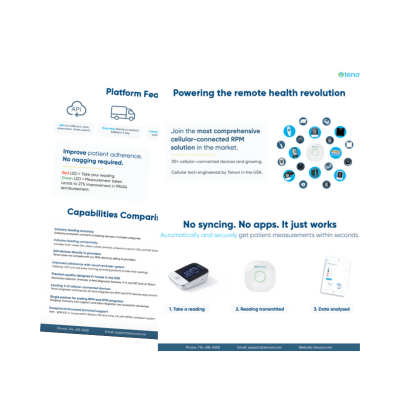Medication adherence remains one of the most persistent challenges in healthcare. It directly impacts outcomes, costs, and quality of care. But what are the barriers to medication adherence, and why do so many patients struggle to follow prescribed treatment plans?
In this article, we explore five of the most common obstacles from forgetfulness and complex regimens to socioeconomic factors. We also introduce one remote therapeutic monitoring solution designed to help patients stay on track stay on track and improve medication adherence over time.
What are the Barriers to Medication Adherence?
Medication adherence is the extent to which patients take medications as prescribed by their healthcare providers. It is a complex issue influenced by various factors. According to research, 80% or more adherence rates are needed for optimal therapeutic efficacy. However, medication nonadherence can account for up to 50% of failures in treatment.
A 2019 meta-analysis found that non-adherent patients over age 55 showed a significant association with hospitalization and mortality. Identifying barriers to medication adherence and developing supportive solutions is vital to overcoming challenges with medication adherence.
Over 80 factors have been associated with medication nonadherence. These barriers can range from forgetfulness and lack of understanding to socioeconomic challenges and medication side effects. We have outlined five of the most common reasons that answer the question: what are the barriers to medication adherence?
1) Forgetfulness and Disrupted Routines
One significant barrier to medication adherence is forgetfulness. In a 2024 study, fifty 1 and type 2 diabetic patients aged 59 and over were asked to identify barriers to adherence. 44% said forgetfulness was a factor. With busy lives and disrupted routines, simply forgetting to take pills can make it easy to miss doses, especially for those taking multiple medications at different times per day. Patients may also forget to refill their prescriptions.
2) Lack of Understanding
In the same study previously mentioned, 40% cited illiteracy as a reason for nonadherence. A patient’s ability to read and understand medication instructions is paramount. Patients with low literacy may have difficulty understanding instructions. This can create a barrier to medication management.
Another barrier to medication adherence is a lack of understanding about why the regimen matters. Misunderstanding the purpose of the medication, underestimating its importance, concerns about side effects, and unrealistic expectations about how quickly results should appear can all contribute to nonadherence.
3) Lack of Symptoms
When patients feel no difference after starting or stopping a medication, they may assume it’s unnecessary. Others stop taking it once they feel better, believing the issue is resolved. Research shows nonadherence is highest among patients without symptoms. This can lead to serious consequences for chronic conditions such as hypertension, where symptoms may not appear even when the condition is poorly managed.
4) Complex Treatment Plans and Multiple Medications
Chronic care patients with multiple conditions may have several medications to take more than once per day. The more medications a patient takes, the harder it may be to keep up. Complex regimens, requiring multiple pills at different times, can make it hard for patients to stay consistent. Frequent dosing adds another layer of difficulty and is a common barrier when we ask: what are the barriers to medication adherence?
5) Counseling and Communication
The Centers for Disease Control and Prevention (CDC) reports that 20 – 30% of new prescriptions are never filled by patients. One barrier to medication adherence is poor communication around how and why medications should be taken. In fact, inadequate counseling accounts for 55% of medication nonadherence. In the previously mentioned study of diabetic patients, 84% cited a lack of guidance as a barrier to medication adherence. Understanding a patient’s reasoning for non-adherence, and clearly communicating the importance of adherence is critical to improving outcomes.
The CDC suggests asking patients the following questions:
- Did you have a list of all your medicines and exact doses of over-the-counter medications, vitamins, and herbal supplements?
- Do you know why you take each medication?
- Do you know how your medicines affect your condition?
- When your medications are changed, do you review and update them with your pharmacist?
- Do you report medication side effects to your pharmacist?
- Do you inform your pharmacist if you miss doses of your medicines?
The Tenovi Cellular-Connected Pillbox: Overcoming Adherence Barriers
Self-reporting is the most frequent method used for measuring medication adherence. A new technology known as a smart pillbox is helping to remove errors associated with self-reporting and other medication adherence barriers. A smart pillbox allows providers to monitor adherence remotely and intervene before complications due to nonadherence arise.
The Tenovi Pill Box is a cellular-connected remote therapeutic monitoring device that automatically tracks when pill compartments are opened and closed, and transmits the event data to providers through a Cellular Gateway device. The pill compartment lights up red to remind patients when its time to take medication.
For added support, the Cellular Gateway also lights up red as a reminder and turns green once the compartments are opened and the event is transmitted to the care team. With no apps, syncing, or Wi-Fi required, the Tenovi Smart Pillbox fits easily into daily routines.
Understanding: What are the Barriers to Medication Adherence?
As you’ve learned, forgetfulness, lack of understanding, and complex regimens can all be barriers to medication adherence. Missed doses can lead to sub-optimal health outcomes. The Tenovi Pill Box is a new solution that unobtrusively tracks adherence to give providers and patients the data needed to improve medication taking behaviors.
Tenovi works exclusively with companies that want to offer remote patient monitoring solutions to healthcare providers. Would you like to learn more about how the Tenovi Pill Box works? Book your free demo today!


